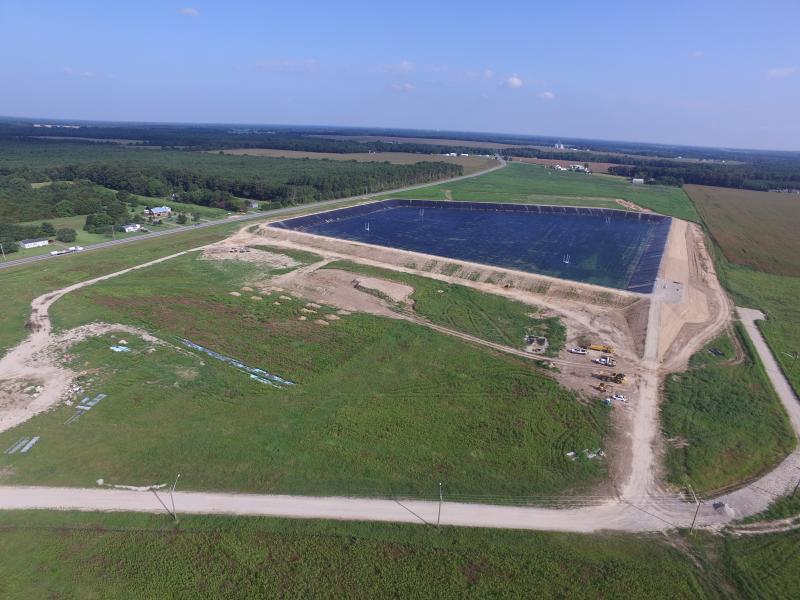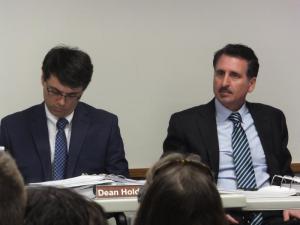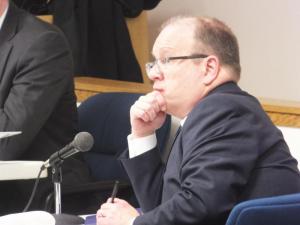Environmental board upholds Artesian permit
Artesian Water Co.’s permit to build a spray irrigation facility near Milton has been unanimously upheld by a state board.
The March 12 Environmental Appeals Board ruling comes nearly a year after citizens group Keep Our Wells Clean was allowed to challenge Artesian’s construction permit for the 1,700-acre Sussex Regional Recharge Facility, which is slated to accept treated water from Allen Harim’s poultry processing plant in Harbeson.
Keep Our Wells Clean founders Andrea Green and Anthony Scarpa said they will consult with legal counsel before possibly filing an appeal of the board’s decision with Delaware Superior Court. Artesian still needs an operations permit from Department of Natural Resources and Environmental Control before it can begin pumping. Scarpa and Green said they plan to request a hearing when that permit is applied for.
“This is round one,” Scarpa said.
Artesian’s Chief Financial Officer and Treasurer Dave Spacht said the ruling is appropriate.
“The site selection was done a long time ago. It’s all in the operations permit to make sure we’re monitoring things as required. That’s the next step,” he said.
Spacht said he did not think the legal battles would affect Artesian’s plans to begin operating the facility later this year.
The board will release a written document within 90 days supporting its decision.
Keep Our Wells Clean was seeking a reappraisal of Artesian’s permit by DNREC on the grounds that the facility’s environmental impacts and uses were not properly vetted when the permit was approved in 2017.
Artesian and DNREC attorneys argued at the March 12 hearing that plans for the site did not require further review, and that DNREC was well within its purview to approve Artesian’s permit application.
The primary witness at the hearing was Jack Hayes, DNREC’s program manager working on the Artesian permit. Under questioning from Keep Our Wells Clean attorney Kenneth Kristl, Hayes said Artesian’s 2017 permit was an amendment to a previous permit issued in 2013. By 2017, he said, DNREC made regulatory changes that were not in place when the original permit was issued.
Hayes said in DNREC’s purview, the changes required for Artesian’s 2017 permit were not enough to force Artesian to go back and get a new permit. Kristl argued that Artesian should have been forced to comply with the new regulations when Artesian announced it was accepting industrial wastewater from Allen Harim.
Hayes testified that the original 2013 permit called for pumping 1 million gallons of wastewater a day; the 2017 update calls for 1.5 million to 2 million gallons per day. Hayes added that in 2013, DNREC had determined that the site could handle 6 million to 7 million gallons per day.
He said the original intention was for Artesian to have an on-site treatment facility and a 60-million-gallon lagoon. The updated permit eliminated the on-site treatment facility - since Allen Harim would be handling treatment - and increasing the lagoon size to 90 million gallons.
Hayes testified that the permit is for Phase 1 of what Artesian has proposed as a four-phase project.
Keep Our Wells Clean has argued the proposed irrigation fields would adversely impact wetlands and groundwater in the area. Deputy Attorney General Deborah Scott, representing DNREC, said Kristl was cherry-picking facts to attempt to argue that DNREC acted in an arbitrary and capricious manner.
Kristl’s second witness, Dr. Christopher Goebel, a hydrologist, was going to be brought to testify about the groundwater effects of the facility. But Artesian attorney R.J. Skaggs objected to Goebel’s testimony, on the grounds that none of what he was testifying about was part of the appeal. Kristl said Goebel’s testimony was intended to establish that DNREC had not looked at all the information regarding the site.
The board agreed with Skaggs and disallowed Goebel’s testimony.
Following the hearing, Scarpa said, “They wouldn’t even allow our witness to testify. We felt like we weren’t really given a fair run at this thing.”
The Artesian facility was originally planned for a proposed development called Elizabethtown. When that development did not get built, Artesian sought other customers - the city of Rehoboth Beach was considered - before a deal was struck to pump treated wastewater from Allen Harim to Artesian’s facility.
Ryan Mavity covers Milton and the court system. He is married to Rachel Swick Mavity and has two kids, Alex and Jane. Ryan started with the Cape Gazette all the way back in February 2007, previously covering the City of Rehoboth Beach. A native of Easton, Md. and graduate of Towson University, Ryan enjoys watching the Baltimore Ravens, Washington Capitals and Baltimore Orioles in his spare time.























































